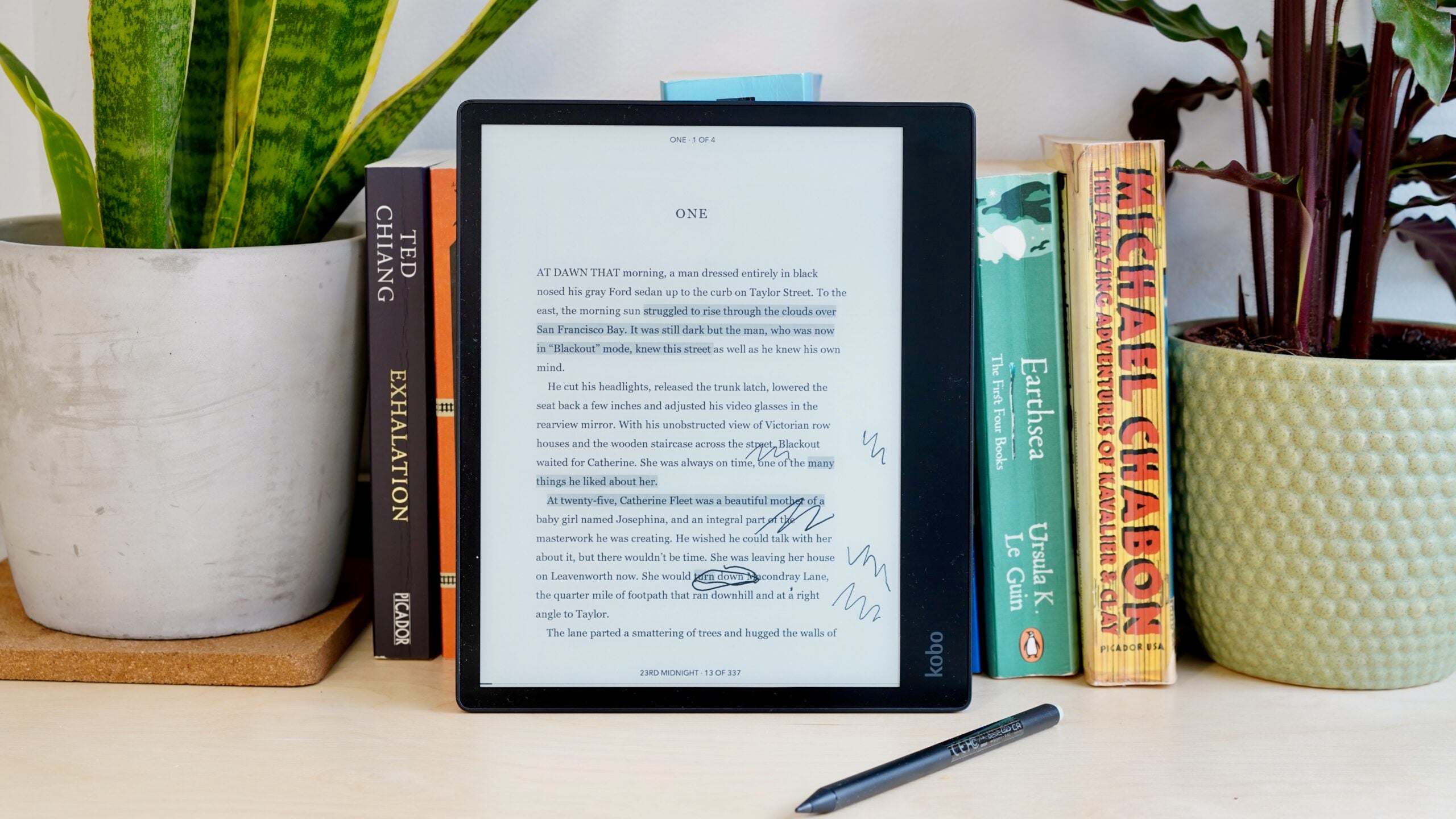Verdict
The Kobo Elipsa 2E is another strong pick for the platform-agnostic or anti-Amazon eBook consumer. Its large, clear screen is great for reading, while the Kobo Stylus 2 and accompanying software make for a useful note-taking tool.
Pros
- Extensive file support
- Dropbox, OverDrive and Pocket support
- Powerful handwriting recognition
- Ability to annotate your eBooks
Cons
- Performance isn’t amazing
- Not as premium-feeling as Kindle
- Odd unresponsiveness bug
- Stylus needs charging separately
Availability
- UKRRP: £349.99
- USARRP: $399.99
-
Great stylus integrationWith impressive handwriting recognition and the ability to annotate eBooks, the Stylus 2 is a great addition to the Elipsa 2E setup. -
Extensive file supportSupports 15 file formats natively, with the only exception being Amazon’s AZW format. -
Long battery lifeKobo’s vague promise of “weeks of battery life” rings true with the e-reader not requiring a single charge in the two-week test period.
Introduction
If any brand has managed to give Amazon’s Kindle eReader operation a sore nose (it would be too strong to suggest that it had drawn blood), it’s Kobo. Now, with the Kobo Elipsa 2E, it’s the top-of-the-line Kindle Scribe eReader-notepad hybrid that’s in this Rakuten subsidiary’s crosshairs.
At a price of £349.99 (or $399.99 in the US), Kobo is asking you to pay £30 less than the equivalent model of the Kindle Scribe. With that said, Amazon does offer a simpler, lower-capacity entry model for £329.99.
Pricing aside, the Kobo Elipsa 2E offers some interesting perks over its big-selling rival, including some smarter pen functions and Kobo’s more eclectic eBook ecosystem. Its release has also been accompanied by the wider rollout of Kobo Plus, offering unlimited access to a selection of eBooks for a monthly subscription.
It could be argued that Amazon didn’t quite hit the target with its own scribbly eReader, so there’s a hint of an opening in the market here, especially given that Kobo has had the chance for a warm-up with the original Elipsa.
Design
- Made from recycled and ocean-bound plastic
- 390g and 7.5mm thick
- Optional SleepCover case isn’t very good
Kobo is keen to point out the green credentials of its latest eReaders, with the Elipsa 2E made up of recycled and ocean-bound plastic. Even so, this choice of materials makes the Elipsa 2E feel quite a bit cheaper than the (100% recycled) aluminium Kindle Scribe.
The design is otherwise broadly similar, with an asymmetrical look that places a particularly thick bezel to one side. This is where you’re expected to hold the device, or at least bear much of the weight. Like the Scribe, you get no waterproofing here, which is similarly tough to swallow in such an expensive Reader.
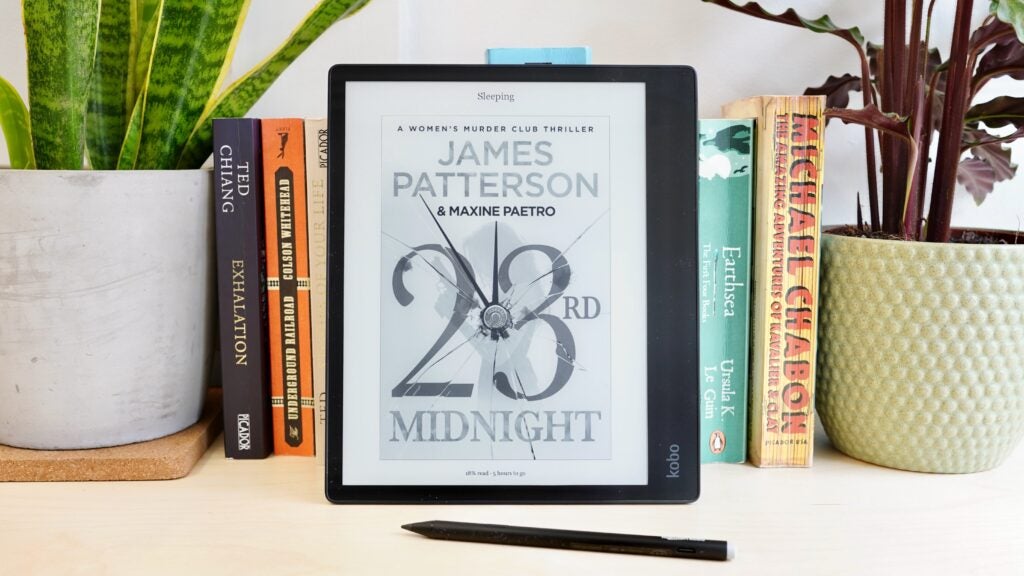
Both the textured power button and the USB-C port are positioned on one end of this thicker edge. This makes both elements readily accessible when propping the device on a lap or table.
You’ll probably be doing quite a lot of propping, as this is a particularly large eReader, with a tall and wide 193 x 227 body that weighs 390g. That makes it quite a bit lighter than the 433g Kindle Scribe, though the latter is thinner (5.8mm vs 7.5mm).
There’s an optional SleepCover folio case for the Kobo Elipsa 2E, which I also tested out. It feels somewhat pricey at £69.99, especially given that it’s essentially just a screen cover and a more secure holder for the Kobo Stylus 2. Its magnetised cover didn’t ever quite square up properly when it closed for me, adding to the flimsy feeling, and it doesn’t secure to the back of the device when fully opened out.
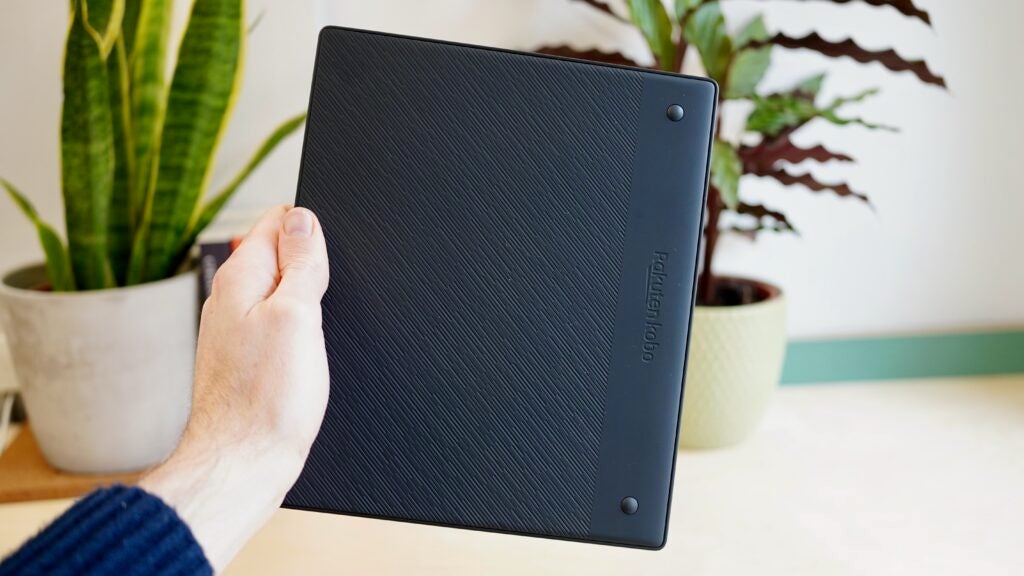
Screen and Pen
- 10.3-inch E-Ink Carta 1200 touchscreen
- 227 PPI
- Kobo Stylus 2 included
The Kobo Elipsa 2E is fronted by a 10.3-inch E Ink Carta 1200 touchscreen, with a 1404 x 1872 resolution. Unfortunately, it doesn’t hit the pin-sharp 300 PPI of the Kindle Scribe or smaller and cheaper eReaders, only managing 227 PPI, though text remains nice and legible.
Indeed, the actual quality of that panel is very good indeed. ComfortLight PRO technology serves to reduce blue light and ease eye strain, allowing you to move from cool to warm as the light drops. It’s a shame there’s no auto-brightness function, but as someone who always likes to fine-tune such things anyway, it wasn’t really an issue for me.
The main difference between the Elipsa 2E and other eReaders in the Kobo line is the provision of a stylus, called the Kobo Stylus 2. Resembling a full-sized pen, the Stylus 2 enables you to annotate eBooks and PDFs, as well as write in digital notebooks.
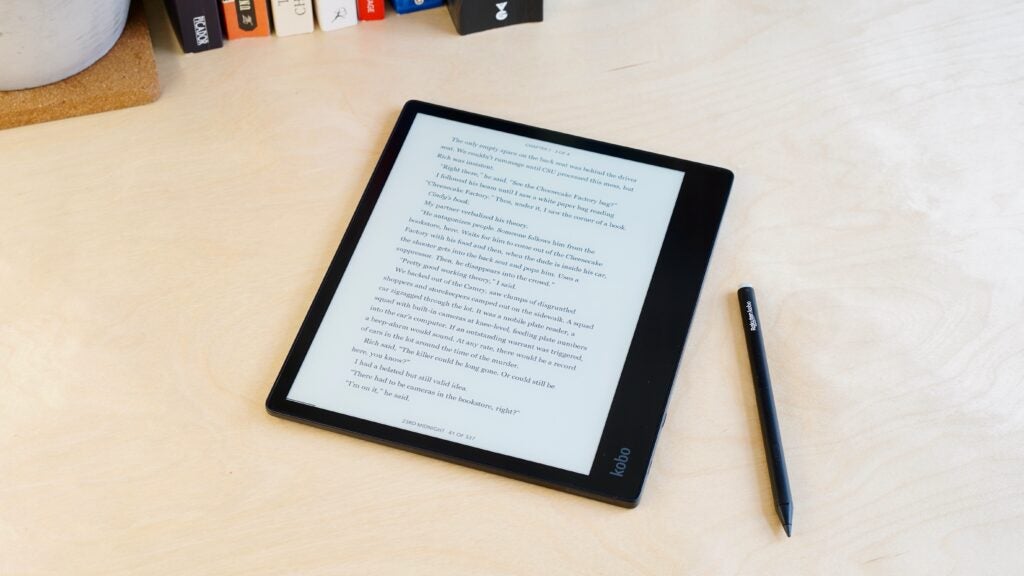
This area is much more fully fleshed out in the Kobo than it is in the Kindle Scribe. When setting up a new notebook, you have the option of freeform scribbling or a more advanced form for note-taking, with the ability to convert hand-written notes into digital (and thus exportable) text. It worked really well for me, even when my handwriting got a little ragged. I also appreciated touches like being able to circle text to highlight it, or underlining it to make it into a title.
There’s also a button on the side of the Stylus 2 that will turn it into a highlighter when pressed, which is particularly convenient when taking advantage of one of the coolest features here. Unlike the Kindle Scribe, you can actually annotate your eBooks with the Elipsa 2E, scrawling in the margins and highlighting text. It makes for a much better study aid than Amazon’s rival device, that’s for sure.
The writing experience itself is reasonably accurate, with just a hint of lag spoiling the experience. It’s not as paper-like as, say, an Apple Pencil on an iPad or an S Pen on a Samsung Galaxy S Ultra, but it’s not bad.
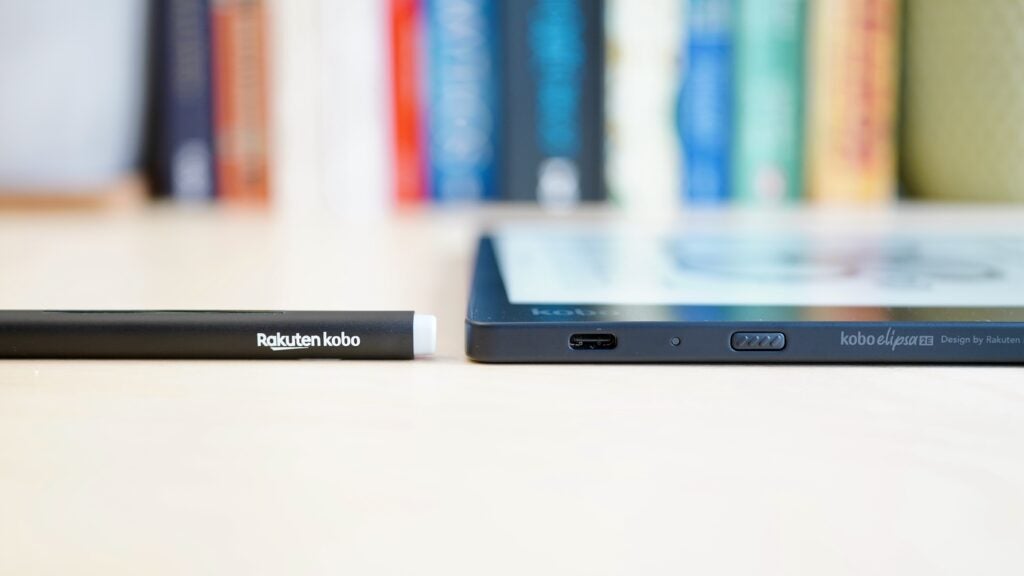
There’s an eraser on the back of the Stylus, though this works in a slightly clumsy fashion, often deleting large chunks of your scribbling rather than applying a nuanced direct effect. It’s nice to see such a feature included as standard though, unlike with the Kindle Scribe, which makes it an optional extra.
On a practical note, it’s annoying that you have to manually charge the Kobo Stylus 2 using a USB-C port. The Kindle Scribe doesn’t place such a requirement on you, and there’s no tool for keeping track of how much juice is left in the Stylus 2 on the Kobo itself.
When not being used the Kobo Stylus 2 attaches securely to the rear of the device, where the Kobo logo is, via the same magnets that are used to affix the SleepCover. However, you can also use the weaker front fastening magnet to keep the pen stuck (albeit weakly) to the front on the thicker bezel, or along one of the shorter edges.
Performance
- 2GHz CPU yields adequate performance
- Support for 15 file formats
- Battery lasts weeks
The Kobo Elipsa 2E runs on a 2GHz CPU and 1GB of RAM, which generally proves ample for the simple tasks it’s designed to carry out. I wouldn’t say that flicking between tabs is speedy, exactly, but it’s adequate for an eReader.
There were some initial responsiveness issues with my test unit, and these were largely put to bed with a couple of firmware updates. However, I still experienced the odd time where the Elipsa 2E simply didn’t respond to my touch inputs. Sometimes in these situations, only the Kobo Stylus 2 would elicit a response, suggesting that the touch recognition system is a little off.
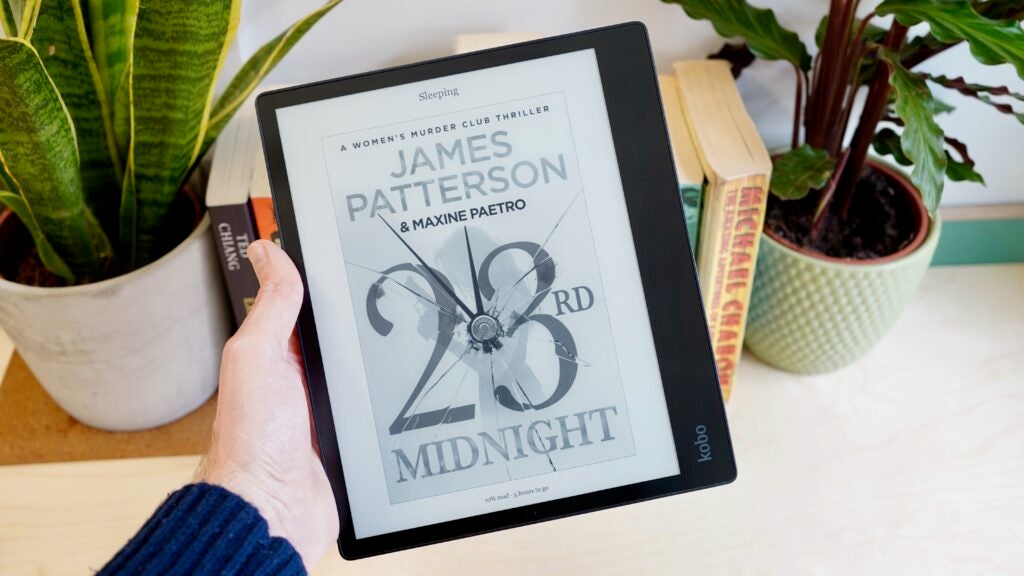
This would appear to be a software issue rather than a hardware one, so hopefully it’ll be resolved with future updates. But it’s not ideal.
More generally speaking, software has always been where the Kobo line distinguishes itself from Amazon’s Kindle range. While the latter is a walled garden, offering a vast but closed-off library of reading and listening material and making it difficult to stray beyond those borders, Kobo takes a more open approach.
On a basic level, the Kobo Elipsa 2E simply supports way more file types than any Amazon Kindle (15 of the suckers), and doesn’t make you jump through hoops to access eBooks that haven’t been obtained directly through the Kobo store. You can even import files through Dropbox, and Google Drive support is said to be coming soon.
Naturally, if most of your eBooks have been bought through Amazon, then you won’t be able to access them here. But then, presumably you’d be all in on Kindle if that was the case anyway.
Kobo recently rolled out Kobo Plus in the UK and US, which is its monthly subscription service and answer to Amazon’s Kindle Unlimited. For £8.99 a month (£11.99 if you want audiobooks too) you get unlimited access to a bunch of eBooks.
Admittedly, the storefront on the Kindle Elipsa 2E isn’t exactly brimming with the hottest new books, and it isn’t particularly brilliant at surfacing book recommendations either. The number of categories on display is pretty limited, keeping most of the library tucked out of sight. You wouldn’t even know that there was a vast library of free classics to download and read on the service, so you’ll need to use the hit-and-miss search system to locate specific titles.
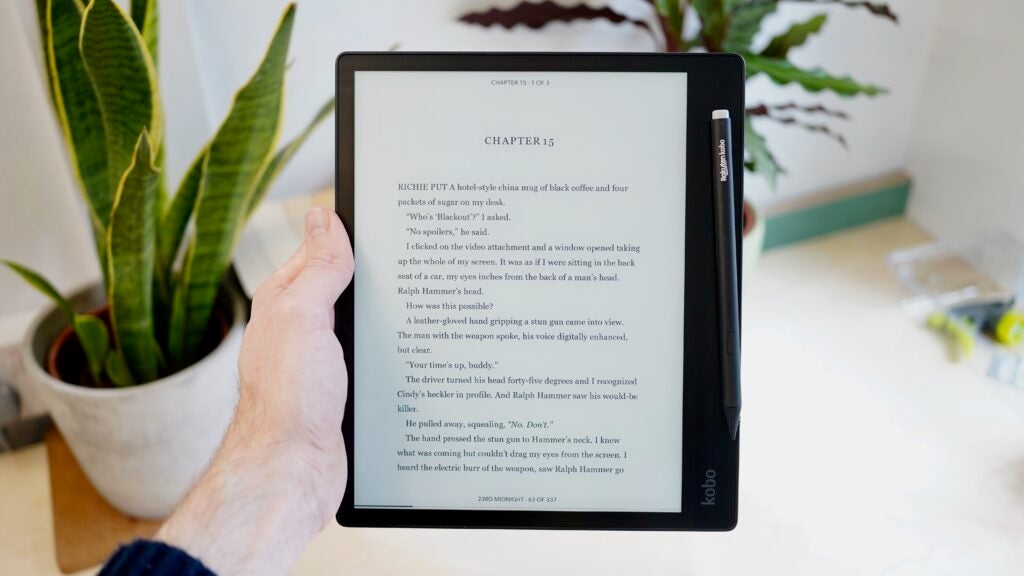
OverDrive support is a brilliant feature, enabling you to hook up to your local library and essentially ‘borrow’ books from their digital repository. If the cost of eBooks is a worry, and you don’t want to rely on the patchy selection of Kobo Plus, it’s a great option.
Another benefit of Kobo’s more open, nuanced approach is that it features support for the Pocket service, making the Kobo Elipsa 2E great for reading long-form web content with none of the usual ad flab. Opt to read it later on Pocket whilst surfing the web on your phone, and you’ll be able to read it back on that lovely 10.3-inch E Ink screen later on.
When it comes to storing all these books and documents, there’s 32GB of internal storage as standard, which should prove ample. It’s a shame there’s no option for something a little more capacious, as with the Amazon Kindle Scribe, but it’s not a bad middle ground to shoot for.
Kobo employs the rather vague promise of “Weeks of battery life”, but there’s really nothing to worry about on the stamina front. I wasn’t able to run the device down in the couple of weeks I had it on test.
There’s no charging brick in the box though, so you’ll need to attach the included USB-C to USB-A cable to your phone charger or some other means.
Latest deals
Should you buy it?
You want to scribble in the margins: If you’re someone who likes to annotate their books, the Kobo Elipsa 2E will let you scrawl away to your heart’s content with the bundled Kobo Stylus 2.
You have a lot of Kindle eBooks: Just about the only major eBook format the Kobo doesn’t support is Amazon’s AZW.
Final Thoughts
The Kobo Elipsa 2E isn’t just a great alternative to the Kindle Scribe – it’s a flat-out better product in a number of ways. While its build isn’t as premium and it technically costs a little more, you’re getting an advanced eReader that offers a far more fleshed-out note-taking experience than its rival.
Being able to write directly onto the pages of eBooks and highlight text is brilliant for deep readers and students, while powerful handwriting recognition makes the Elipsa 2E useful as a note-taking tool to boot.
It’s particularly compelling if your eBook library is scattered across a number of non-Amazon sources, as Kobo makes it relatively easy to pull them all together in one place. Pocket and OverDrive support further expands your possibilities, and the addition of a Kobo Plus subscription service covers the whole Kindle Unlimited-shaped gap that used to exist.
Kobo Plus could use some fleshing out, performance could be silkier, and there are a few lingering responsiveness bugs that need ironing out. It’s annoying that you have to charge the Kobo Stylus 2 separately, too. But the Kobo Elipsa 2E is otherwise the best eReader in this very specific note-taking niche.
How we test
We test every e-reader we review thoroughly. We use the device over the review period. We’ll always tell you what we find and we never, ever, accept money to review a product.
Read books to test battery life
Annotated and doodled to test the stylus
FAQs
No, it only comes with a USB-C cable, so you’ll need to supply your own brick.
The SleepCover attaches magnetically and costs £70 in the UK.
Jargon buster
USB-C
The modern USB connector you’ll find on most Android phones, new laptops, cameras and games consoles. It’s reversible and used for charging along with data-transfer.
Verdict
The Kobo Elipsa 2E is another strong pick for the platform-agnostic or anti-Amazon eBook consumer. Its large, clear screen is great for reading, while the Kobo Stylus 2 and accompanying software make for a useful note-taking tool.
Pros
- Extensive file support
- Dropbox, OverDrive and Pocket support
- Powerful handwriting recognition
- Ability to annotate your eBooks
Cons
- Performance isn’t amazing
- Not as premium-feeling as Kindle
- Odd unresponsiveness bug
- Stylus needs charging separately
Availability
- UKRRP: £349.99
- USARRP: $399.99
-
Great stylus integrationWith impressive handwriting recognition and the ability to annotate eBooks, the Stylus 2 is a great addition to the Elipsa 2E setup. -
Extensive file supportSupports 15 file formats natively, with the only exception being Amazon’s AZW format. -
Long battery lifeKobo’s vague promise of “weeks of battery life” rings true with the e-reader not requiring a single charge in the two-week test period.
Introduction
If any brand has managed to give Amazon’s Kindle eReader operation a sore nose (it would be too strong to suggest that it had drawn blood), it’s Kobo. Now, with the Kobo Elipsa 2E, it’s the top-of-the-line Kindle Scribe eReader-notepad hybrid that’s in this Rakuten subsidiary’s crosshairs.
At a price of £349.99 (or $399.99 in the US), Kobo is asking you to pay £30 less than the equivalent model of the Kindle Scribe. With that said, Amazon does offer a simpler, lower-capacity entry model for £329.99.
Pricing aside, the Kobo Elipsa 2E offers some interesting perks over its big-selling rival, including some smarter pen functions and Kobo’s more eclectic eBook ecosystem. Its release has also been accompanied by the wider rollout of Kobo Plus, offering unlimited access to a selection of eBooks for a monthly subscription.
It could be argued that Amazon didn’t quite hit the target with its own scribbly eReader, so there’s a hint of an opening in the market here, especially given that Kobo has had the chance for a warm-up with the original Elipsa.
Design
- Made from recycled and ocean-bound plastic
- 390g and 7.5mm thick
- Optional SleepCover case isn’t very good
Kobo is keen to point out the green credentials of its latest eReaders, with the Elipsa 2E made up of recycled and ocean-bound plastic. Even so, this choice of materials makes the Elipsa 2E feel quite a bit cheaper than the (100% recycled) aluminium Kindle Scribe.
The design is otherwise broadly similar, with an asymmetrical look that places a particularly thick bezel to one side. This is where you’re expected to hold the device, or at least bear much of the weight. Like the Scribe, you get no waterproofing here, which is similarly tough to swallow in such an expensive Reader.

Both the textured power button and the USB-C port are positioned on one end of this thicker edge. This makes both elements readily accessible when propping the device on a lap or table.
You’ll probably be doing quite a lot of propping, as this is a particularly large eReader, with a tall and wide 193 x 227 body that weighs 390g. That makes it quite a bit lighter than the 433g Kindle Scribe, though the latter is thinner (5.8mm vs 7.5mm).
There’s an optional SleepCover folio case for the Kobo Elipsa 2E, which I also tested out. It feels somewhat pricey at £69.99, especially given that it’s essentially just a screen cover and a more secure holder for the Kobo Stylus 2. Its magnetised cover didn’t ever quite square up properly when it closed for me, adding to the flimsy feeling, and it doesn’t secure to the back of the device when fully opened out.

Screen and Pen
- 10.3-inch E-Ink Carta 1200 touchscreen
- 227 PPI
- Kobo Stylus 2 included
The Kobo Elipsa 2E is fronted by a 10.3-inch E Ink Carta 1200 touchscreen, with a 1404 x 1872 resolution. Unfortunately, it doesn’t hit the pin-sharp 300 PPI of the Kindle Scribe or smaller and cheaper eReaders, only managing 227 PPI, though text remains nice and legible.
Indeed, the actual quality of that panel is very good indeed. ComfortLight PRO technology serves to reduce blue light and ease eye strain, allowing you to move from cool to warm as the light drops. It’s a shame there’s no auto-brightness function, but as someone who always likes to fine-tune such things anyway, it wasn’t really an issue for me.
The main difference between the Elipsa 2E and other eReaders in the Kobo line is the provision of a stylus, called the Kobo Stylus 2. Resembling a full-sized pen, the Stylus 2 enables you to annotate eBooks and PDFs, as well as write in digital notebooks.

This area is much more fully fleshed out in the Kobo than it is in the Kindle Scribe. When setting up a new notebook, you have the option of freeform scribbling or a more advanced form for note-taking, with the ability to convert hand-written notes into digital (and thus exportable) text. It worked really well for me, even when my handwriting got a little ragged. I also appreciated touches like being able to circle text to highlight it, or underlining it to make it into a title.
There’s also a button on the side of the Stylus 2 that will turn it into a highlighter when pressed, which is particularly convenient when taking advantage of one of the coolest features here. Unlike the Kindle Scribe, you can actually annotate your eBooks with the Elipsa 2E, scrawling in the margins and highlighting text. It makes for a much better study aid than Amazon’s rival device, that’s for sure.
The writing experience itself is reasonably accurate, with just a hint of lag spoiling the experience. It’s not as paper-like as, say, an Apple Pencil on an iPad or an S Pen on a Samsung Galaxy S Ultra, but it’s not bad.

There’s an eraser on the back of the Stylus, though this works in a slightly clumsy fashion, often deleting large chunks of your scribbling rather than applying a nuanced direct effect. It’s nice to see such a feature included as standard though, unlike with the Kindle Scribe, which makes it an optional extra.
On a practical note, it’s annoying that you have to manually charge the Kobo Stylus 2 using a USB-C port. The Kindle Scribe doesn’t place such a requirement on you, and there’s no tool for keeping track of how much juice is left in the Stylus 2 on the Kobo itself.
When not being used the Kobo Stylus 2 attaches securely to the rear of the device, where the Kobo logo is, via the same magnets that are used to affix the SleepCover. However, you can also use the weaker front fastening magnet to keep the pen stuck (albeit weakly) to the front on the thicker bezel, or along one of the shorter edges.
Performance
- 2GHz CPU yields adequate performance
- Support for 15 file formats
- Battery lasts weeks
The Kobo Elipsa 2E runs on a 2GHz CPU and 1GB of RAM, which generally proves ample for the simple tasks it’s designed to carry out. I wouldn’t say that flicking between tabs is speedy, exactly, but it’s adequate for an eReader.
There were some initial responsiveness issues with my test unit, and these were largely put to bed with a couple of firmware updates. However, I still experienced the odd time where the Elipsa 2E simply didn’t respond to my touch inputs. Sometimes in these situations, only the Kobo Stylus 2 would elicit a response, suggesting that the touch recognition system is a little off.

This would appear to be a software issue rather than a hardware one, so hopefully it’ll be resolved with future updates. But it’s not ideal.
More generally speaking, software has always been where the Kobo line distinguishes itself from Amazon’s Kindle range. While the latter is a walled garden, offering a vast but closed-off library of reading and listening material and making it difficult to stray beyond those borders, Kobo takes a more open approach.
On a basic level, the Kobo Elipsa 2E simply supports way more file types than any Amazon Kindle (15 of the suckers), and doesn’t make you jump through hoops to access eBooks that haven’t been obtained directly through the Kobo store. You can even import files through Dropbox, and Google Drive support is said to be coming soon.
Naturally, if most of your eBooks have been bought through Amazon, then you won’t be able to access them here. But then, presumably you’d be all in on Kindle if that was the case anyway.
Kobo recently rolled out Kobo Plus in the UK and US, which is its monthly subscription service and answer to Amazon’s Kindle Unlimited. For £8.99 a month (£11.99 if you want audiobooks too) you get unlimited access to a bunch of eBooks.
Admittedly, the storefront on the Kindle Elipsa 2E isn’t exactly brimming with the hottest new books, and it isn’t particularly brilliant at surfacing book recommendations either. The number of categories on display is pretty limited, keeping most of the library tucked out of sight. You wouldn’t even know that there was a vast library of free classics to download and read on the service, so you’ll need to use the hit-and-miss search system to locate specific titles.

OverDrive support is a brilliant feature, enabling you to hook up to your local library and essentially ‘borrow’ books from their digital repository. If the cost of eBooks is a worry, and you don’t want to rely on the patchy selection of Kobo Plus, it’s a great option.
Another benefit of Kobo’s more open, nuanced approach is that it features support for the Pocket service, making the Kobo Elipsa 2E great for reading long-form web content with none of the usual ad flab. Opt to read it later on Pocket whilst surfing the web on your phone, and you’ll be able to read it back on that lovely 10.3-inch E Ink screen later on.
When it comes to storing all these books and documents, there’s 32GB of internal storage as standard, which should prove ample. It’s a shame there’s no option for something a little more capacious, as with the Amazon Kindle Scribe, but it’s not a bad middle ground to shoot for.
Kobo employs the rather vague promise of “Weeks of battery life”, but there’s really nothing to worry about on the stamina front. I wasn’t able to run the device down in the couple of weeks I had it on test.
There’s no charging brick in the box though, so you’ll need to attach the included USB-C to USB-A cable to your phone charger or some other means.
Latest deals
Should you buy it?
You want to scribble in the margins: If you’re someone who likes to annotate their books, the Kobo Elipsa 2E will let you scrawl away to your heart’s content with the bundled Kobo Stylus 2.
You have a lot of Kindle eBooks: Just about the only major eBook format the Kobo doesn’t support is Amazon’s AZW.
Final Thoughts
The Kobo Elipsa 2E isn’t just a great alternative to the Kindle Scribe – it’s a flat-out better product in a number of ways. While its build isn’t as premium and it technically costs a little more, you’re getting an advanced eReader that offers a far more fleshed-out note-taking experience than its rival.
Being able to write directly onto the pages of eBooks and highlight text is brilliant for deep readers and students, while powerful handwriting recognition makes the Elipsa 2E useful as a note-taking tool to boot.
It’s particularly compelling if your eBook library is scattered across a number of non-Amazon sources, as Kobo makes it relatively easy to pull them all together in one place. Pocket and OverDrive support further expands your possibilities, and the addition of a Kobo Plus subscription service covers the whole Kindle Unlimited-shaped gap that used to exist.
Kobo Plus could use some fleshing out, performance could be silkier, and there are a few lingering responsiveness bugs that need ironing out. It’s annoying that you have to charge the Kobo Stylus 2 separately, too. But the Kobo Elipsa 2E is otherwise the best eReader in this very specific note-taking niche.
How we test
We test every e-reader we review thoroughly. We use the device over the review period. We’ll always tell you what we find and we never, ever, accept money to review a product.
Read books to test battery life
Annotated and doodled to test the stylus
FAQs
No, it only comes with a USB-C cable, so you’ll need to supply your own brick.
The SleepCover attaches magnetically and costs £70 in the UK.
Jargon buster
USB-C
The modern USB connector you’ll find on most Android phones, new laptops, cameras and games consoles. It’s reversible and used for charging along with data-transfer.


















